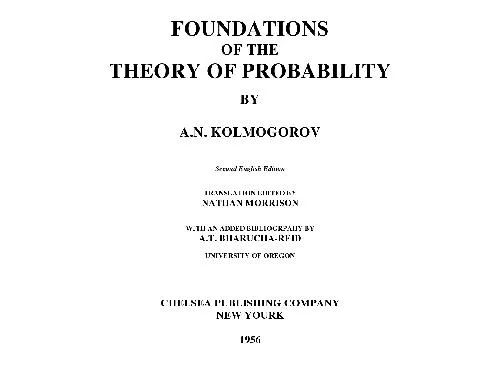Foundations of the theory of probability;
4.6
Reviews from our users

You Can Ask your questions from this book's AI after Login
Each download or ask from book AI costs 2 points. To earn more free points, please visit the Points Guide Page and complete some valuable actions.Related Refrences:
Introduction to "Foundations of the Theory of Probability"
"Foundations of the Theory of Probability," authored by A. N. Kolmogorov, is a seminal work that lays the mathematical groundwork for modern probability theory. First published in 1933, this book revolutionized the way probability is understood, studied, and applied by combining rigorous axiomatic methods with the study of random phenomena. In this introduction, we will explore the key elements of the book: its summary, key takeaways, famous quotes, and its significance in the wider field of mathematics, science, and beyond.
Detailed Summary of the Book
"Foundations of the Theory of Probability" introduces an axiomatic system for probability, establishing probability as a branch of mathematics. This work eliminates ambiguities in earlier probabilistic theories by formulating basic axioms, similar to other mathematical disciplines like geometry and algebra. At its core, the book defines probability as a measure on a set of events and carefully builds essential concepts such as independence, random variables, and conditional probabilities.
The book begins by detailing the essential prerequisites, including sets, functions, and measures, that form the building blocks of probability theory. Kolmogorov then presents his now-famous axioms of probability, which include the following principles:
- Probability values are non-negative real numbers.
- The probability of the sure event (the entire sample space) is 1.
- If two events are disjoint, the probability of their union equals the sum of their individual probabilities.
These axioms form the foundation upon which all subsequent developments in probability theory are based. Kolmogorov elaborates on key derivations, such as the law of large numbers, convergence theorems, and the application of probability distributions. His approach bridges abstract mathematics with practical applications, making this book timeless and foundational for disciplines including physics, engineering, economics, statistics, and computer science.
Key Takeaways
- Kolmogorov's axioms provide a universal and consistent framework for probability theory.
- The book formalizes the relationship between probability theory and measure theory, providing a rigorous mathematical structure.
- It highlights the universality of probability in solving real-world problems, from predicting outcomes to modeling uncertainty.
- Kolmogorov's work underpins the development of modern areas in mathematics, statistics, and even machine learning.
Famous Quotes from the Book
"The axiomatic method has proved exceptionally successful in mathematics, and probability theory owes its future development to adopting the same foundation."
"Probability is a tool that allows us to confidently navigate uncertainty by adhering to a strict mathematical structure."
"By constructing probability theory on an axiomatic foundation, we avoid ambiguity and establish clarity for all future studies."
Why This Book Matters
Kolmogorov's "Foundations of the Theory of Probability" remains one of the most influential mathematical treatises of the 20th century. It elegantly shifted probability theory from an intuitive, philosophical domain into a rigorous and systematic mathematical framework. This profound transformation has had far-reaching consequences for science and technology, influencing areas like statistics, data science, artificial intelligence, physics, financial modeling, and risk management.
By defining probability with precision and universal application, Kolmogorov made it possible to use probability as a tool for solving practical problems involving randomness and uncertainty. The axiomatic approach introduced in his book highlights the importance of mathematical rigor in addressing real-world challenges. Furthermore, the book is not just a historical artifact; its principles live on as critical components of modern mathematics and science.
Simply put, "Foundations of the Theory of Probability" is a cornerstone of human understanding in both theory and application. It is a must-read not only for mathematicians but for anyone seeking a deeper comprehension of how probability governs the world around us.
Free Direct Download
You Can Download this book after Login
Accessing books through legal platforms and public libraries not only supports the rights of authors and publishers but also contributes to the sustainability of reading culture. Before downloading, please take a moment to consider these options.
Find this book on other platforms:
WorldCat helps you find books in libraries worldwide.
See ratings, reviews, and discussions on Goodreads.
Find and buy rare or used books on AbeBooks.
1190
بازدید4.6
امتیاز0
نظر98%
رضایتReviews:
4.6
Based on 0 users review
Questions & Answers
Ask questions about this book or help others by answering
No questions yet. Be the first to ask!





![The Ultimate iOS Interview Playbook: Conquer Swift, frameworks, design patterns, and app architecture [Team-IRA]](https://s3.refhub.ir/images/thumb/The_Ultimate_iOS_Interview_Playbook__Conquer__29925.webp)







